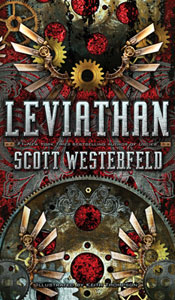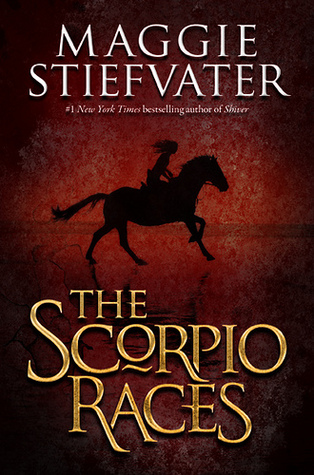LEVIATHAN by Scott Westerfeld, (Simon Pulse, 2009).
GENRE: Adventure - Steampunk / Alt. History
AGE: 12 and up
Scott Westerfeld's Leviathan, the first book in a planned trilogy, is the sort of old-fashioned adventure novel that you don't see much of anymore. It's the sort of book that would have shared shelf-space with Treasure Island and The Time Machine if it were written 100 years ago, which it couldn't have been, even if Orwell could have conceived of genetic mutations and gene splicing. This is mostly because, for all its harkening back to the days of the "boy's adventure story," Westerfeld's Leviathan is the product of a modern phenomena - the mashed-up landscape of alt. history in all it's steam-powered glory.
The book starts on the night of Archduke Franz Ferdinand's assassination, an event that plunged Europe into the First World War. The Archduke's son, Prince Aleksander, flees for the Swiss border with a handful of trusted retainers in a Cyklops Stormwalker, as massive, humanoid war machine. With that, Westerfeld plunges the reader into an alternative world, one where WWI is fought between Clankers (nations with advanced mechanized technology) and the Darwinists (England and it's allies, who create new species based on Darwin's principles).
Westerfeld develops both sides through alternating chapters. While Alek learns to pilot the Stormwalker and dodge hostile troops, a young woman named Daryn Sharp disguises herself as a boy and joins the British Air Service. Through sheer accident, (her cephalopodic jellyfish - you really just need to read the book - gets caught in a storm), she's rescued by the Leviathan, a massive, living, hydrogen-based airship. As events on the world stage grow tense, the Stormtrooper and the Leviathan make their way to Switzerland, where Alek's Clankers and the Deryn's Darwinists finally meet.
Before you know it, you're fully engaged in the Leviathan's secret mission to Constantinople and the question of how Alek will survive the war without getting assassinated. It's Westerfeld's mastery of real history that makes his alternative history so seemlessly compelling. There is nothing inauthentic about the tension between the Clankers and the Darwinists. The fabric of cultural antipathy is woven so tightly that you never question the possibility of the mechanical and genetic advances that define each society.
And it isn't just the world that fascinates. Deryn and Alek are honestly interesting. Though they both fit certain archetypes, there is nothing of the stock character about either of them. Both are nuanced individuals who grow as a result of the rather extraordinary circumstances they find themselves in. The supporting characters are equally fun, particularly Wildcount Volger, the mastermind behind Alek's escape, and Dr. Nora Barlow, a female "boffin" or genetic engineer who tartly takes all manner of things into her own hands.These adults are quirky, flawed and capable. They leave the young protagonists ample room to move and plenty of agency without descending into the stereotypical uselessness of so many adults in book for teens.
To make a long story short - too late, I know - Leviathan is a shockingly fun read. Get past the first several chapters and you're off. Even without the maps and illustrations (which are jolly good fun), it's nearly impossible not to get sucked into Westerfeld's WWI. Entirely engaging and oddly educational, Leviathan is classic in the best sense of the word.
October 26, 2012
October 11, 2012
The Scorpio Races
THE SCORPIO RACES by Maggie Stiefvater (Scholastic Press, 2011)
GENRE: Fantastic Realism / Romance
AGE: 14 and up
Though not without issues, The Scorpio Races is an excellent book. It has countless starred reviews and a Printz Honor to prove it, and though it takes more than that to convince me of anything, I agree that, for the most part, it lives up to the hype - the plotting is solid, the language is lovely and the setting is moody and atmospheric. That said, I'd like to leave all that aside and look at the two elements that gave this book a quality rare in mainstream YA lit. The first is the seamless integration, in the form of the water horses, of the fantastic into a story that is otherwise rooted staunchly in reality. The other is the subtlety of the Stiefvater's characterizations, particularly with Sean Kendrick. But a little summary first:
Every October, the capaill uische, mythical and predatory water horses, come up out of the water onto the fictional island of Thisby. Their arrival culminates, on November 1st, with the Scorpio Races, a day of bloody racing where the men of the island ride the capaill uische across the beach, some to glory, many to death. Sean Kendrick has won the Scorpio Races four years out of six, and is respected on the island, despite his silence and stillness, thanks to his uncanny way with horses, both mundane and magical. Kate, aka Puck, Connelly, has never had use for the races and has always steered clear of capaill uische, particularly since her parents died the year before. But when her older brother announces that he's moving to the mainland, Kate decides to ride in the races, not for honor, but for the winners purse. But as Nov. 1st gets closer, the stakes get higher for both Puck and Sean until the day of the race when their fates are decided on the bloody beach.
The capaill uische legend has a lot of variants. Based on the source materials, this could easily have become just another romance about a girl who falls in love with a shapeshifting beast. But Stiefvater takes a more nuanced approach. The Isle of Thisby is a windblown, rocky place with it's roots deep in the past. It has little need for the present. It is losing it's young people to mainland, its only real economies are fishing and tourism and there are scant opportunities for work, (issues that reflect the current reality of many small towns). Stiefvater layers the magical water horses into this reality without explanation or excuse, and the technique works. By defying the temptation to myth-make, Stiefvater grounds the story, keeping the focus on her characters' determination to transcend the limitations of their situations. Though the romance is a key element, the narrative isn't about the relationship that grows between Sean and Puck. It is much more about Sean and Puck coming into their own. They simply find each other in the process.
The other element that works particularly well is Sean's character development. Puck is plucky and emotionally true, but she is of a recognizable type (feisty red-head with plenty of guff) whereas I've never seen a character quite like Sean. He's nineteen, but an old nineteen, with a stillness and perspective that, while impressive, reads as natural to his character. His chapters (the story is told with alternating POV) contain some of the loveliest, most incisive observations I've read in a while. His arc is a subtle one and watching him rock and re-center on his foundation was a quiet pleasure.
While younger readers will enjoy the horsey elements of the book, and the romance is fairly tame and tween approved, I would say that Puck and Sean go places that older teens will identify with more readily. Though the pacing is somewhat sluggish (all those lovely descriptive elements occasionally bog down the plot), The Scorpio Races is a beautiful read, subtle in ways that are rare in YA fiction. It really is a winner - especially if you happen to like horses, and even if you don't.
GENRE: Fantastic Realism / Romance
AGE: 14 and up
Though not without issues, The Scorpio Races is an excellent book. It has countless starred reviews and a Printz Honor to prove it, and though it takes more than that to convince me of anything, I agree that, for the most part, it lives up to the hype - the plotting is solid, the language is lovely and the setting is moody and atmospheric. That said, I'd like to leave all that aside and look at the two elements that gave this book a quality rare in mainstream YA lit. The first is the seamless integration, in the form of the water horses, of the fantastic into a story that is otherwise rooted staunchly in reality. The other is the subtlety of the Stiefvater's characterizations, particularly with Sean Kendrick. But a little summary first:
Every October, the capaill uische, mythical and predatory water horses, come up out of the water onto the fictional island of Thisby. Their arrival culminates, on November 1st, with the Scorpio Races, a day of bloody racing where the men of the island ride the capaill uische across the beach, some to glory, many to death. Sean Kendrick has won the Scorpio Races four years out of six, and is respected on the island, despite his silence and stillness, thanks to his uncanny way with horses, both mundane and magical. Kate, aka Puck, Connelly, has never had use for the races and has always steered clear of capaill uische, particularly since her parents died the year before. But when her older brother announces that he's moving to the mainland, Kate decides to ride in the races, not for honor, but for the winners purse. But as Nov. 1st gets closer, the stakes get higher for both Puck and Sean until the day of the race when their fates are decided on the bloody beach.
The capaill uische legend has a lot of variants. Based on the source materials, this could easily have become just another romance about a girl who falls in love with a shapeshifting beast. But Stiefvater takes a more nuanced approach. The Isle of Thisby is a windblown, rocky place with it's roots deep in the past. It has little need for the present. It is losing it's young people to mainland, its only real economies are fishing and tourism and there are scant opportunities for work, (issues that reflect the current reality of many small towns). Stiefvater layers the magical water horses into this reality without explanation or excuse, and the technique works. By defying the temptation to myth-make, Stiefvater grounds the story, keeping the focus on her characters' determination to transcend the limitations of their situations. Though the romance is a key element, the narrative isn't about the relationship that grows between Sean and Puck. It is much more about Sean and Puck coming into their own. They simply find each other in the process.
The other element that works particularly well is Sean's character development. Puck is plucky and emotionally true, but she is of a recognizable type (feisty red-head with plenty of guff) whereas I've never seen a character quite like Sean. He's nineteen, but an old nineteen, with a stillness and perspective that, while impressive, reads as natural to his character. His chapters (the story is told with alternating POV) contain some of the loveliest, most incisive observations I've read in a while. His arc is a subtle one and watching him rock and re-center on his foundation was a quiet pleasure.
While younger readers will enjoy the horsey elements of the book, and the romance is fairly tame and tween approved, I would say that Puck and Sean go places that older teens will identify with more readily. Though the pacing is somewhat sluggish (all those lovely descriptive elements occasionally bog down the plot), The Scorpio Races is a beautiful read, subtle in ways that are rare in YA fiction. It really is a winner - especially if you happen to like horses, and even if you don't.
Subscribe to:
Posts (Atom)

